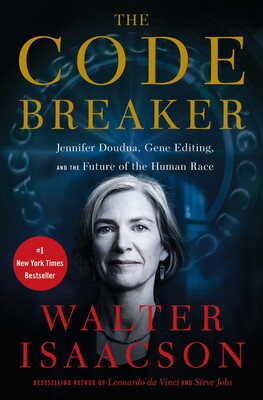What Is It to Be Human Anymore?
By Michael Hirsh,
Foreign Policy
| 04. 02. 2021
This book is not for the faint of mind. Walter Isaacson is a great storyteller who has devoted his justly acclaimed career as a biographer to such history-changing individuals as Albert Einstein, Steve Jobs, Henry Kissinger, and Leonardo da Vinci. Now, in his new book The Code-Breaker: Jennifer Doudna, Gene Editing, and the Future of the Human Race, he tries to do the same with Jennifer Doudna, the engaging and brilliant University of California, Berkeley scientist who shared the 2020 Nobel Prize in chemistry with her French collaborator Emmanuelle Charpentier for discovering the inner workings of gene editing. Supported by a cast of eager and intensely competitive scientists who spanned the globe from Spain to China, Doudna and Charpentier figured out how to not only make human gene editing relatively simple but also turn it into what is, simultaneously, a hope-giving and terrifying technology.
As is typical for his work, Isaacson has done prodigious research—even learning to gene-edit himself. But perhaps his biggest challenge was that it may be easier to explain the achievements of da Vinci or even...
Related Articles
By Scott Solomon, The MIT Press Reader | 02.12.2026
Chris Mason is a man in a hurry.
“Sometimes walking from the subway to the lab takes too long, so I’ll start running,” he told me over breakfast at a bistro near his home in Brooklyn on a crisp...
By Zachary Brennan, Endpoints News | 02.23.2026
The FDA is spelling out the details of a new pathway to help speed personalized cell and gene therapies to market for rare diseases.
Monday’s long-awaited draft guidance outlines the agency’s “plausible mechanism” framework, a pathway FDA Commissioner Marty Makary...
By Amy Feldman, Forbes | 02.17.2026
"Jennifer Doudna" by Duncan Hull for the Royal Society via Wikimedia Commons licensed under CC by SA 3.0
Soon after KJ Muldoon was born in August 2024, he was lethargic and wouldn’t eat. His worried doctors realized his ammonia...
By David Jensen, California Stem Cell Report | 02.10.2026
Touchy issues involving accusations that California’s $12 billion gene and stem cell research agency is pushing aside “good science” in favor of new priorities and preferences will be aired again in late March at a public meeting in Sacramento.
The...




